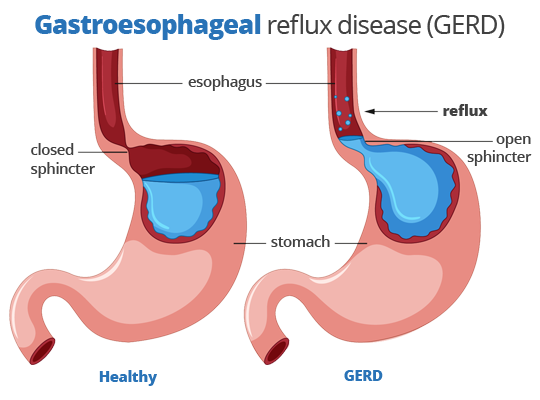Gastroesophageal Gastric Disease (GERD), gastric reflux disease or acid reflux disease is nothing but a bitter taste in the mouth, a chronic cough, sore throat, fatigue or if you’re waking every morning with these symptoms of nighttime heartburn. Night-time heartburn affects nearly four out of five of heartburn sufferers – disturbing sleep and impairing the ability to function properly during the day. We can all suffer from GERD including infants and children (most difficult to detect).

What causes the GERD?
There are various reasons to contribute to GERD, such as: the lower esophageal sphincter, hiatal hernias, esophageal contractions, and emptying of the stomach.
What is Lower Esophageal Sphincter (LES)?
His function is perhaps the most important factor to prevent the GERD. When food or saliva is swallowed, the LES relaxes for a few seconds allowing the food or saliva to pass from the esophageus into the stomach and then it closes again.
Hiatal Hernias
Although it’s not clear how the hiatal hernias contribute to the disease, these have been found in patient with GERD. Normally the LES is located at the same level where the esophageus passes through the diaphragm and into the abdomen, when there is a hernia, a small part of the stomach and the LES comes to lie in the chest.
Other ways the hernia could affect the GERD is when a hernial sac is created, this sac traps acid that comes to the stomach, and keeps it close to the esophageus. Another form that affects is that the esophagus normally joins the stomach obliqualy, creating a passsage in the form of a valve, preventing reflux and when there is a hernia, the stomach is pulled up to the chest, the valve dissapears and can not loger prevent the reflux.
Esophageal contractions
As part of the normal process, swallowing causes a contraction all the way through the lower esophageus, eliminating acids, pushing food and saliva. In patients with GERD, reflux acid is not pushed back, the contractions may die before they reach the stomach.
Emptying the stomach
Most of the reflux happen after meals. The slower emptying the stomach prolongs the distension of the stomach with food after meals.



